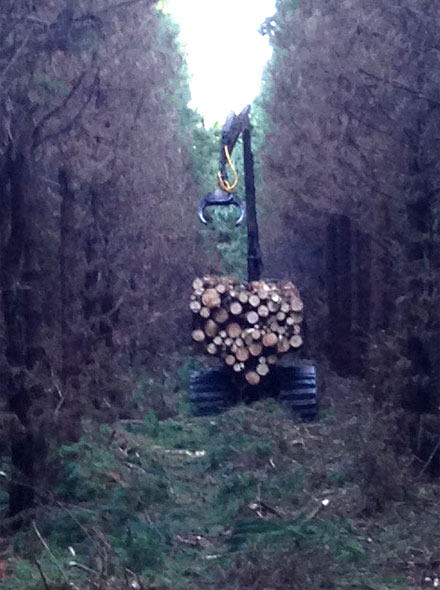
Northland wood processors are upset overseas companies are taking local trees before New Zealand-owned businesses have a chance to access them, and shipping unmilled logs straight to Shanghai. Source: Stuff NZ
A meeting is being held between local processors and China Forestry Group to discuss plans for the forestry block adjacent to the historic Treaty Grounds at Waitangi.
And NZ First’s candidate Shane Jones said he was concerned about the activities of Chinese Government-owned China Forest Products in the Rototuna forest near Dargaville.
He said it had been harvesting pine trees that were too young to be used by New Zealand firms, and sending them overseas.
Mr Jones says local wood processors are missing out.
There was already a lack of access to raw wood to sustain domestic saw millers and processors, he said.
“I am horrified by the reported conduct of China Forest Products, which is owned by the Chinese government and recently purchased cutting rights on the Waitangi estate.
“I fear a Beijing tree massacre at Waitangi … They must honour their Overseas Investment Office approval and ensure these trees lead to jobs in our Northland processing sector. I am also sending a message to the Kiwi staff working for this Chinese Government company, do not become implicated in destroying the Whangarei jobs of your fellow Kiwis. This Waitangi forest resource must serve the North before it satisfies the Pearl Delta.”
Pine forests are not usually felled until they are at least 28 years old, when the wood is strong enough to be used for construction timber. But it can still be used before that time to make low-grade plywood and timber for concrete boxing.
Brian Stanley, chair of the Wood Processors and Manufacturers Association, said China had started to look internationally for its supply of wood because of problems with its own forests.
“Chinese manufacturers are quite happy to take 20-year-old trees.”
But when firms felled those younger trees and shipped them overseas it meant they did not have the chance to grow into the types of trees that would be useful to New Zealand processors.
Steve Walker, chief operations officer at China Forestry Group NZ Company, said he could understand the concerns ownership. The other, Rototuna, was managed by PF Olsen and was on average 21 years old.
“Around 40% of our total harvest from both forests is sold to domestic markets. Almost all the high-value timber is sold to domestic mills. The balance is exported. New Zealand mills in Northland either do not buy some of the grades we produce or do but for well less than the export price. We always try to maximise forest value,” he said.
“China Forestry Group and PF Olsen share the concern about young age harvest at Rototuna and since late 2016 have been taking steps to slow the harvest there to allow harvest age to increase. We also need to be mindful of local contractors who have invested in people and equipment for this work and we are purchasing other older forests for them to move to. My role with CFG was created in late 2016 to help steer this outcome.”
He said he was happy to meet any interested stakeholders.
Mr Jones said China Forest Products was not showing good corporate conduct in taking the wood while it was young and not offering any supply to local processers. That was something it had pledged in its application to the Overseas Investment Office.
He said a key factor in them gaining approval had been that they would boost local employment opportunities. But instead they seemed to be inhibiting access for domestic processors and making it more difficult.
“Over time this Chinese Government-owned firm will end up driving New Zealanders on to the dole queue … If the Chinese Government knew one of the firms they own was operating in this fashion they themselves would move swiftly to fix the situation,” he said.
A strong supply of timber would be vital to help resolve the country’s housing crisis.
“I would not support future acquisitions by this entity if their recent activity is any indication of their plans for New Zealand.”
Northpine manager Bruce Larsen said there were wider concerns that more wood was being taken out of Northland than was sustainable.
“Whole forests are being sold to overseas buyers that appear to have no intent of ever offering domestic processors the opportunity to purchase the wood,” he said.
Some international operators were operating in a way that supported the local industry, but there was no overarching strategy to ensure that forestry assets were managed well.







